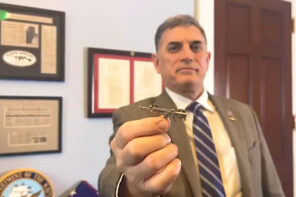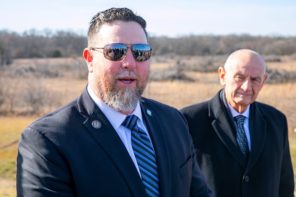In an effort to promote freedom of religion, Republican State Rep. Todd Russ introduced House Bill 1125 in the Oklahoma House of Representatives which would amend certain of the state’s marriage laws. Specifically, HB 1125, passed by the Oklahoma House on March 10th, eliminates all statutory references to state-issued marriage licenses.
Russ’s apparent goal for the bill is to preemptively protect court clerks who feel their personal religious beliefs would be violated by fulfilling the duties of their job and issuing marriage licenses to same-sex couples. In 2014 a federal judge ruled Oklahoma’s ban on same-sex marriages unconstitutional.
As was not lost on those who offered up initial responses in the press and on blogs, there is something interesting—and, for many, disturbing—about this effort to eliminate the marriage license in Oklahoma. Along with Russ himself, however, many of these responses are confused, due to a lack of understanding of the nature and purpose of a marriage license.
According to his official press release about the passage of HB 1125, Russ believes that eliminating state-issued marriage licenses will “get government out of marriage and resolve the same-sex marriage controversy.” Would ceasing to issue marriage licenses really “take the state out of the process and leave marriage in the hands of the clergy” as Russ hopes and many opponents fear? Not really.
The bill would still require that those to be married must be 18 or older—unless a minor (16-17) has parental consent (or that of a legal guardian)—a marriage cannot be incestuous, and Oklahoma will not recognize polygamous and other currently unsanctioned unions. But this also means that, even if marriage licenses cease to be issued, Oklahoma would not cede much, if any, new authority to religious communities and their leaders, in spite of what some headlines would have us believe. Indeed, in terms of whom religious leaders are permitted by the state to marry, nothing, it appears, would substantively change under HB 1125.
Nor would it change the already existing, and problematically worded, kinds of religious groups that can currently offer such religious unions. Those permitted to perform a religious marriage service in Oklahoma are to have “been duly ordained or authorized by the church to which he or she belongs to preach the Gospel, or a rabbi…”
Apparently Christians and Jews and Baha’i (thanks to a clarifying note later in the law) are the kinds of religious people who can ceremoniously marry in religious settings in Oklahoma. Think about that for a second: the State of Oklahoma sets certain basic terms that determine which marriages religions are permitted to have and promote. This is an example of what Winnifred Sullivan has famously termed the impossibility of religious freedom.
Thus, in order to free court clerks from having to endorse same-sex marriage by issuing state marriage licenses, Russ wants the clerks only to record marriages entered into through either religious services or a legal affidavit validating the existence of a common law marriage—already an option in Oklahoma—for everyone else.
In this act of recognition, these clerks incorporate the married—even those marriages between same-sex couples—into the state’s marriage complex, including all the rights and responsibilities of a legal marriage. Changing the clerk’s role from actively licensing something they disapprove of to one of passively acknowledging that what they despise occurred, while still making sure that the marriage in question is recognized by the state, changes little.
Moreover, as all the litigation around the Affordable Care Act’s contraception mandate has so powerfully illustrated, people will find ways, if they want to, to understand their religious rights as being trammeled upon no matter what procedural tweaks and accommodations are granted to them by the government. Russ’s court clerks who do not like same-sex marriages will likely still feel oppressed under the terms of HB 1125.
All of this is not to say that this bill, if signed into law, would make no difference. Indeed, I suspect it would strengthen the legal position of common law marriage in Oklahoma. Americans United for Separation of Church and State views the status of common law marriage in Oklahoma as “shaky at best,” a position that reflects a possible ambiguity around the validity of common law marriages after the passage of a law in 1998 (one way to tell this legal story can be found here).
But at least some legal firms operating in Oklahoma (such as this one and this one) consider common law marriage’s status as more secure, pointing toward the failure of a 2005 bill that would have definitively ended common law marriage in Oklahoma and noting that it has been upheld by state courts at least as recently as 2001. Having to submit an affidavit establishing people’s common law marriage would, most likely, only strengthen the legal position of these unions since it would create a clear and stable record of their existence in the eyes of the courts. Plus, if tens of thousands of marriages are designated as common law it would be hard for Oklahoma to spontaneously negate them en masse.
But the probable strengthening of common law’s legal standing is not, in my view, among the more interesting implications of HB 1125. The idea of asking everyone who does not want a religious wedding performed by a religious leader to marry under common law seems to strike a nerve with opponents, many of whom are worried about the status of marriages by atheists.
One friend, for example, expressed the concern that, if passed, HB 1125 would create a dual-track system analogous to that of civil unions and marriages. In other words, she feared that atheists would be stuck with a second rate, if not outright fake, common law marriage while real marriage was reserved for the religious people of the land.
But that analogy is faulty since, legally, both the certificates and affidavits submitted to the court clerks would establish the same marriage for all in the eyes of the state. Hence there would be no separate but (not so) equal sets of marital rights and responsibilities, or even nomenclature divvied up between common law and religious unions. Instead, there would only be a difference in whose weddings (not marriages per se) were acknowledged by the state as having occurred and to matter.
The problem with common law marriage in Oklahoma is not whether or not everyone will get their legal contract, but whether or not their ritual will be blessed by the state. In order to certify that a religious wedding has occurred (and thus that a couple is really married) a religious leader must fill out the required paperwork. Under common law marriage, however, a public ceremony is legally irrelevant. The state does not care if you have a wedding or not. Rather, the state acts as if the couple had not had one.
With regard to common law marriages, Oklahoma courts worry about such things as whether the couple has undertaken a mutual agreement to enter into an exclusive marital relationship (assuming the legal rights and obligations of marriage), have consummated their union, and cohabitate as spouses. HB 1125 reinforces the court’s presumption that no wedding takes place for common law marriages: “[m]arriages not contracted by a formal ceremony pursuant to subsection A of this section may be acknowledged by filing an affidavit of common law marriage with the court clerk.”
In a sense, these common law marriages are positively medieval! To simplify greatly, a valid marriage in Catholic Europe, from around the twelfth through the sixteenth century, was a sacrament entered into by the couple alone. There may well have been a wedding ceremony, and this was strongly encouraged to say the least. But people who met the basic qualifications (e.g. not already married, of age, etc.) married themselves using vows expressed in the present tense (e.g. I take you to be my wife, etc.) and then proceeded to live as husband and wife. More importantly for our current purposes, their marriages did not require a wedding ceremony to be valid and binding.
But Americans do not seem to want medieval marriages. They want marriages with licenses, a form of marriage that emerged in the Protestant Reformation. So what do state-issued marriage licenses have to do with weddings? As legal scholar Mary Anne Case points out in her chapter on marriage in After Secular Law (2011), marriage licenses do not marry people but rather authorize the wedding ceremony to occur—and Americans love their weddings, as Chrys Ingraham so powerfully shows in White Weddings (2008).
Common law marriages do not feel or seem like marriage to many Americans because they lack the ritual entry point of marriage and change the scope of recognition granted by the state around marriage ceremonies. Lamenting the possible loss of marriage licenses is a way to register people’s fear of losing their (state-sanctioned) weddings and the marital certainty that come with such rituals.




